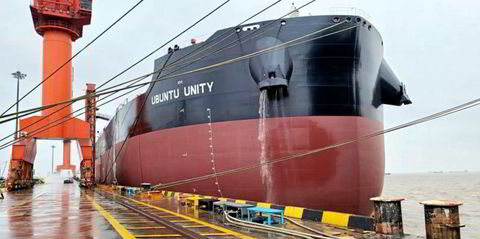Ship surveys ordered by hull underwriters are to be extended to cover bunker management in a major crackdown on a rising tide of catalytic fines-related engine-damage claims.
The London insurance market’s influential Joint Hull Committee (JHC) is adding a specific requirement for surveyors to include bunker handling in the widely used JH10 condition survey wording.
The move will make compliance with recommendations to minimise the risk of cat fines-related claims a “condition precedent” of hull policies and means owners who flout the advice could face problems if they need to make a claim.
The number of cat fines-related slow-speed engine claims is rising rapidly, with catastrophic damage costing millions of dollars, and major — but less serious — cases running to hundreds of thousands of dollars.
But it is not just underwriters who are exposed. Shipowners face loss of hire and vessels being put out of action for repairs.
“This is an opportunity for us to work with shipowners for our mutual benefit,” said JHC chairman Peter Townsend of Swiss Re Corporate Solutions.
Townsend says it is incumbent on underwriters to take action on issues such as cat fines against the “loss, loss, loss” background of the hull market.
A JHC working group has spent nearly a year investigating the cat-fines problem and is within days of announcing a revised engine-room and machinery audit wording.
The timing is significant as hundreds of underwriters will gather in London this weekend for the annual International Union of Marine Insurance (IUMI) conference (see pages 37 to 47), so the JHC initiative may be taken up by other insurance markets.
The JHC, linking hull underwriters in the Lloyd’s of London company market, is a respected and widely followed organisation, but use of the revised JH10 wording will be up to individual underwriters.
The working group led by Mark Edmondson, a hull underwriter of Chubb syndicate 1882, has produced market advice on cat fines, including a revised survey wording and a technical analysis of the problem.
“There is evidence that high cat fine content is causing an increased frequency of machinery damage,” said Edmondson.
The revision specifically instructs surveyors to look at bunker handling and come up with recommendations to reduce the risk of damage from cat fines.
A condition precedent requires compliance with a requirement for a contract to come into force. If a requirement is set by underwriters about the way bunkers should be handled and treated to minimise the risk of engine damage from cat fines, this has to be followed as a precondition of hull and machinery cover being granted.
The Braemar/Salvage Association surveying group was involved in a dozen cat fines-related damage cases last year — double the level of earlier years — as initiatives to drive down the sulphur content of bunkers and make them cleaner is leading to an increase in microscopic catalytic particles in the fuel.
Townsend says marine engine builder MAN reports that 60% to 70% of claims arising from its engines were as a result of cat fines issues.
But extrapolating these findings across the market has proved a challenge, so it seems there is no comprehensive information on the number of damage claims arising from cat fines or how much they are costing underwriters and owners.
“It is difficult for us as underwriters to know what is a result of cat fines, what is crew negligence, or what is machinery breakdown, but we are doing our best,” said Townsend.
Shipowners who buy into risk mitigation should be rewarded, while those taking risks may find the market tougher, says Townsend, who advocates a “stick and carrot” approach.
So will there be any premium incentive for shipowners to more effectively purify bunkers or improve their fuel handling systems?
It seems unlikely.
“Shipowners who have the best risk-mitigation techniques are well known to underwriters and probably secure pretty good terms already,” said Iain Henstridge of Amlin’s syndicate 2001. “If we have a multi-million dollar cat fines loss, the ship is not earning money and that’s not good for the owner, so we are all in this together.”



